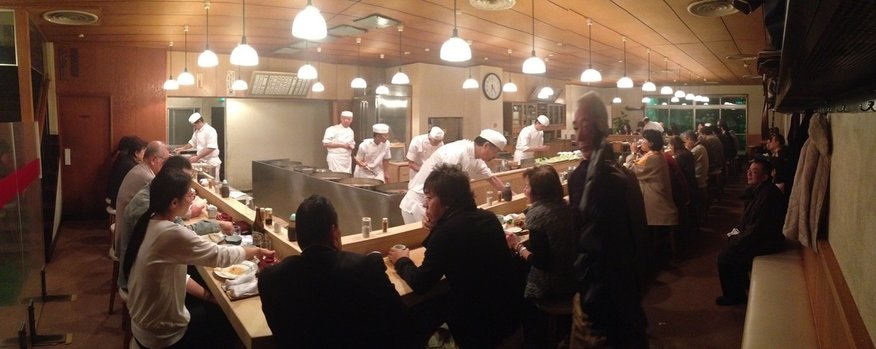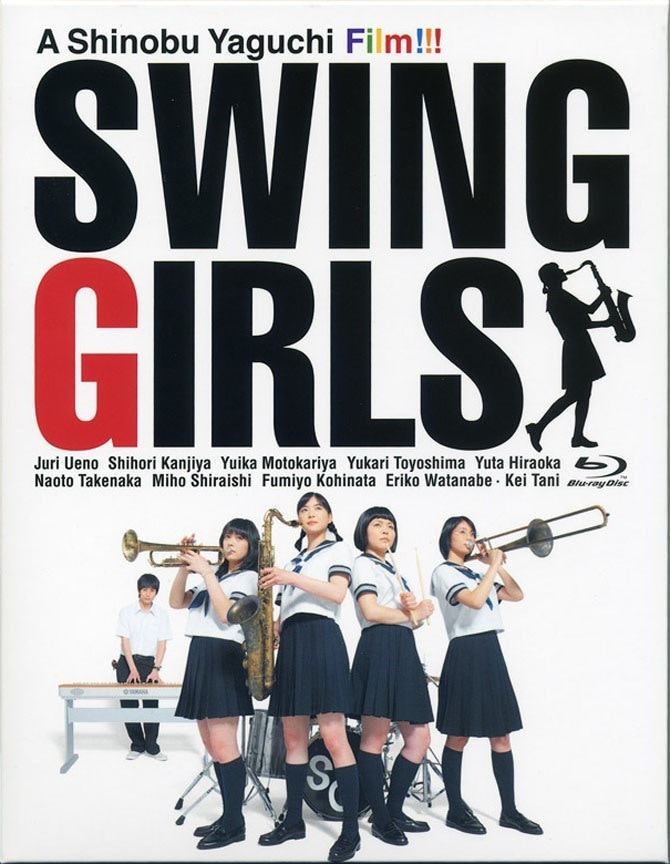|
For a small piece of heaven, visit Tonki in the Meguro district of Tokyo and experience their tonkatsu. Tonkatsu, the only food served at Tonki, is simply a piece of pork breaded with panko breadcrumbs and deep fried. But really it is much more. The pork is more succulent than what you’ll ever find in the West and to say it is deep fried doesn’t really do it justice. No oily KFC-like fried food here. Tonki’s tonkatsu is fried to a crisp perfection. Like most tonkatsu shops, Tonki serves their tonkatsu with shredded cabbage, rice, and miso soup and provides a special tonkatsu sauce and hot mustard as condiments. But Tonki does it better than most. When you enter the shop there’s a U-shaped counter which is where I usually prefer to sit. From there I can watch the cooks prepare my meal, listen in on conversations to either side of me or strike up a conversation with my neighbor. If you arrive before 6pm there’s a good chance you’ll find a seat immediately. Any later and you’ll have to wait. There is a second seating area upstairs, but from that vantage point you miss all the action. If you have the time, I highly recommending waiting for a seat at the counter. When entering Tonki you’re immediately greeted and asked how many are in your party and what you’d like to eat. Fortunately, there are only two things on the menu: hirekatsu (“he-ray-ka-tsu”- pork filet) and rosukatsu (“row-su-ka-tsu”- pork tenderloin). For my money, the hiramatsu is the winner as it’s a bit more succulent, but either is under $20. With that you get rice, an endless mound of shredded cabbage, and miso soup. At an additional cost Beer (“Be-ru”) is the drink of choice but soft drinks are also available.  Getting There: Take the Yamanote line to Meguro Station and exit the station using the west exit (see map above). Bear left outside the station, cross the street and head to the right past a row of buildings to the first street on your left. Tonki is about 50 feet up the street on your left.
1 Comment
Assess: What changes are needed before you go global?
There are a multitude of things you need to consider before going global. Your product is one of them. Product Profile What differentiates your product in your domestic marketplace? Will that difference be sufficient to win share in Japan? If your main differentiator is price, know that in Japan a low price can be both a plus and a minus. Even though their price was more expensive, one client was able to capture a sizable share of the Japanese market with their component precisely because it was better made and resulted in a better end product. Japanese buyers love low pricing, but they won’t sacrifice quality for price. Another client didn’t succeed in Japan until after they realized that what was an acceptable reject rate in the rest of the world isn’t acceptable in Japan at any price. After tightening inspection parameters they succeeded in reducing rejects. They weren’t able to raise the price of their product but they did eventually win a larger share of the customer’s business.
Contact us to learn more. Globalize: Is your company ready and willing to globalize?
The first step in developing an export market is to take an honest inventory of your assets.
Human Resources As Americans we’re lucky because we don’t have to learn English as a foreign language. The flip side is that our birthright has lead to a certain arrogance found in many Americans abroad: My way or the highway! Look for employees with a demonstrated interest in international business and with a track record of success in foreign relations. They will know how much they need to flex and how to be respectful while remaining true to their objectives. Realize too that as you grow in certain markets you will need local staff that know the commercial and personal, socio-linguistic nuances of doing business in their native language. However, they too need to be experienced in working cross-culturally if they are to be successful.
Asia Business Group’s market development process is called G.A.N.B.A.R.E! because it perfectly describes how we bring clients’ products to market. Ganbare is the imperative form of the verb ganbaru which means "to perservere", usually against all odds. To Asia Business Group, ganbare means doing everything possible to give clients access new customers, new markets, new applications, and new information.
G= Globalize: Is your company ready and willing to globalize? A= Assess: What changes are needed before you can go global? N= iNvestigate: Start collecting the information you need. B= Begin: Formulate a strategy flexible and strong enough to ensure success. A= Articulate: Communicate your strategy to stakeholders to test its strength. R= Research: Build quantitative and qualitative data points to check your strategy. E= Execute: Start implementing your strategy, improving as you go. The G.A.N.B.A.R.E! process has been successfully used with a wide range of products and markets giving clients access to new customers and new markets, new applications, and new information. Asia Business Group can begin the G.A.N.B.A.R.E! process at any point or your company can do it by itself. Just be sure the market data you are gathering is verified with locally gathered market information. If your company is looking to access new markets and new customers in Japan or the US, contact us to learn how we can help. For US companies targeting Japan, everything you need to know about succeeding there can be learned by watching the Japanese movie Swing Girls. Well, not quite but let's keep this light! Swing Girls is what would happen if the Bad News Bears met your local high school jazz band. In the process it says a lot about Japanese culture and what it takes to succeed there. The movie is set in Yamakawa High School in Yamagata Prefecture, deep in the northern backwaters of Japan. The girls are in remedial math class when they are roped into becoming the new school pep band. Because there aren't enough of them to form a full band, after hearing a recording of Glen Miller's Moonlight Serenade they decide to become a jazz band. How hard can that be, right? The girls face many obstacles, not the least of which is their complete and utter lack of musical training. But they persist, they "ganbare" because that's what it means to be Japanese: to persist. The girls eventually manage to find a band director who, despite his love of jazz and his undying devotion to the saxophone, is a total failure. Undeterred and now hopelessly smitten with jazz, the girls continue practicing and eventually become good enough to enter a regional high school band competition. Predictably, the forces of nature, their own self-doubt, and any number of minor disasters conspire against them but in the end they prevail. That's ganbare! It's what Japanese do. It's what they admire in themselves, and in others. At about 16:30 in the above clip the girls make their debut at regionals. If you can last that long, I dare you to not smile when the girls launch into Louis Prima's Sing, Sing, Sing at 21:00! Perseverance must be genetically encoded in Japanese DNA because they like nothing more than coming up against long odds and working hard to overcome them. Want to succeed in Japan? Ganbare! It's no coincidence that G.A.N.B.A.R.E! is what Asia Business Group calls its market entry process. Interested in learning more how we can help you ganbare your way to success in Japan? Let us know. (Postscript: If you've gotten this far you'll probably be interested in the backstory to this movie. Only one of the band members had actually played an instrument before filming. Everyone else had to learn to play from scratch! Get the idea?) |
AuthorKevin Crowell Archives
May 2017
Categories |






 RSS Feed
RSS Feed
